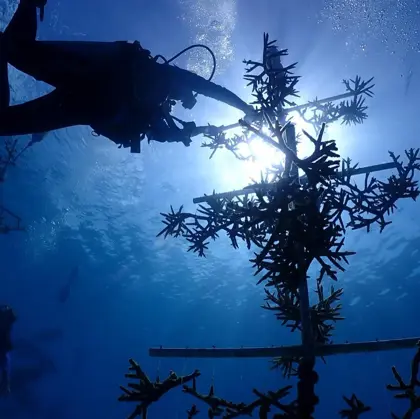If Coral Could Talk
If Coral Could Talk
Coral reefs are under tremendous stress due to climate change, man-made damage, invasive species, and even disease. But maybe we humans would better protect them if they could simply tell us what they need.
When I was young, I loved it when my globetrotting aunt would bring me sparkly, spray-painted “sea rocks” as souvenirs. I had no idea that these ‘rocks’ were once living things. Today, many people do realize that coral is alive as there’s so much news about reefs ‘dying’ due to climate change and coral bleaching. But there’s still much we don’t know about these crucial ecosystems. So, maybe if coral could communicate with us humans, here are a few things they might say…
“Please get to know us better…”
If coral could talk, they’d want you to know they’re not plants, though they contain plant- like algae within them. They’re not rocks either, though their skeletons are akin to limestone. They are small sea creatures related to jellyfish. When you encounter a coral mass, it’s not one single entity. It’s an entire community of gazillion little ‘polyps’—transparent, jelly-like beings— sometimes as small as a pinhead, all living together in one spot.
Each of these little creatures inhabits a ‘corallite’ like an underwater apartment building. They create these underwater homes by building upon their ‘stony’ dead ancestors’ skeletons. Polyps secrete calcium carbonate (limestone) as the glue to hold their corallites together. Though they work together as a community, each polyp has its own space, its own mouth, and its own teeny- tiny set of tentacles tipped with a stinging agent that paralyzes their food. Each little being plays a crucial part in building the enchanting, colorful underwater cities that are essential homes to a multitude of fish and reef creatures.
“Please make our behavior easier to understand…”
If coral could talk, they might ask marine scientists to use simpler words to help educate the public. Words like ‘zooplankton’ and ‘bacterioplankton’ are a mouthful to describe the tiny sea particles that they eat. And ‘zooxanthellae’ is such a long word for the microscopic algae that live within polyps and provide them with most of their nutrition via photosynthesis. It’s a mutually beneficial relationship, as coral provides a protective casing to house them.
Their reproductive behavior is complex too. Most coral reproduce by a process called ‘broadcast spawning.’ They take cues annually from the cycle of the moon to simultaneously release both eggs and sperm in an event that looks like underwater fireworks. If you’re certified to dive, it’s a spectacle that should be at the top of your bucket list.
“Please admire us from afar…”
If coral could talk, they would ask you to keep your distance. Whenever you touch coral, even very lightly, you leave traces of toxins behind that polyps can ingest, which can make them sick. Hard pressure can crush the fragile creatures. And it goes without saying that standing on a reef is a guaranteed death sentence for them. Also, kicking sand in their direction, with your feet or your fins, can smother them too. They are defenseless against our inadvertent assaults. So, be acutely aware of your actions while swimming, snorkeling, or diving around coral reefs.
“Please do your part to keep our oceans clean…”
If coral could talk, we’re sure they’d ask you not to leave trash on the beaches that could end up in the sea. They’d also ask you to avoid single-use plastics. Conserve water, recycle when you can, and use reef-safe sunscreen that doesn’t contain harmful chemicals. They might also ask you to leave their dead ancestors you might find on the beach alone as well. Shells, coral pieces, and even rocks play an important part in stemming beach erosion. And, of course, never purchase souvenirs made with anything living from the sea. Every little action can make a big difference.
“Please help the groups that help us!”
If coral could talk, they would encourage visitors to support the many non-profit organizations throughout the ABC islands that protect and rebuild the coral reefs. Projects like beach and reef clean-ups, planting new coral nurseries and building the gardens, and educating youth on marine life preservation always welcome volunteers. And donations are always welcome, too. You can even adopt a coral! Visit these websites to find out more, and the planet will surely thank you!
Dutch Caribbean Nature Alliance: www.dcnanature.org
Aruba’s Scubble Bubbles Foundation: https://scubblebubbles.org
Aruba Reef Care: www.facebook.com/arubareefcarefoundation
Curacao’s Reef Renewal Program: www.reefrenewalcuracao.org
Curacao’s Carmabi: www.carmabi.org
Reef Renewal Bonaire: www.reefrenewalbonaire.org
By: Susan Campbell

